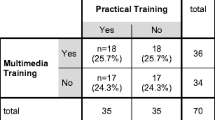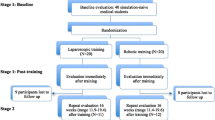Abstract
Introduction
We introduced laparoscopic simulator training for medical students in 2007. This study was designed to identify factors that predict the laparoscopic skill of medical students, to identify intergenerational differences in abilities, and to estimate the variability of results in each training group. Our ultimate goal was to determine the optimal educational program for teaching laparoscopic surgery to medical students.
Methods
Between 2007 and 2015, a total of 270 fifth-year medical students were enrolled in this observational study. Before training, the participants were asked questions about their interest in laparoscopic surgery, experience with playing video games, confidence about driving, and manual dexterity. After the training, aspects of their competence (execution time, instrument path length, and economy of instrument movement) were assessed.
Results
Multiple regression analysis identified significant effects of manual dexterity, gender, and confidence about driving on the results of the training. The training results have significantly improved over recent years. The variability among the results in each training group was relatively small.
Conclusions
We identified the characteristics of medical students with excellent laparoscopic skills. We observed educational benefits from interactions between medical students within each training group. Our study suggests that selection and grouping are important to the success of modern programs designed to train medical students in laparoscopic surgery.


Similar content being viewed by others
References
Tilney HS, Lovegrove RE, Heriot AG et al (2007) Comparison of short-term outcomes of laparoscopic vs open approaches to ileal pouch surgery. Int J Colorectal Dis 22(5):531–542
Raymond TM, Kumar S, Dastur JK et al (2010) Case controlled study of the hospital stay and return to full activity following laparoscopic and open colorectal surgery before and after the introduction of an enhanced recovery programme. Colorectal Dis 12(10):1001–1006
Kanaya S, Haruta S, Kawamura Y et al (2011) Video: laparoscopy distinctive technique for suprapancreatic lymph node dissection: medial approach for laparoscopic gastric cancer surgery. Surg Endosc 25(12):3928–3929
Korndorffer JR Jr., Dunne JB, Sierra R et al (2005) Simulator training for laparoscopic suturing using performance goals translates to the operating room. J Am Coll Surg 201(1):23–29
Ritter EM, Kindelan TW, Michael C et al (2007) Concurrent validity of augmented reality metrics applied to the fundamentals of laparoscopic surgery (FLS). Surg Endosc 21(8):1441–1445
Wohaibi EM, Bush RW, Earle DB et al (2010) Surgical resident performance on a virtual reality simulator correlates with operating room performance. J Surg Res 160(1):67–72
Nomura T, Mamada Y, Nakamura Y et al (2015) Laparoscopic skill improvement after virtual reality simulator training in medical students as assessed by augmented reality simulator. Asian J Endosc Surg 8(4):408–412
Nomura T, Miyashita M, Shrestha S et al (2008) Can interview prior to laparoscopic simulator training predict a trainee’s skills? J Surg Educ 65(5):335–339
Shane MD, Pettitt BJ, Morgenthal CB et al (2007) Should surgical novices trade their retractors for joysticks? Videogame experience decreases the time needed to acquire surgical skills. Surg Endosc 22(5):1294–1297
de Araujo TB, Silveira FR, Souza DL et al (2016) Impact of video game genre on surgical skills development: a feasibility study. J Surg Res 201(1):235–243
Jalink MB, Heineman E, Pierie JP et al (2015) The effect of a preoperative warm-up with a custom-made Nintendo video game on the performance of laparoscopic surgeons. Surg Endosc 29(8):2284–2290
Goldberg AE, Neifeld JP, Wolfe LG et al (2008) Correlation of manual dexterity with USMLE scores and medical student class rank. J Surg Res 147(2):212–215
Schueneman AL, Pickleman J, Freeark RJ (1985) Age, gender, lateral dominance, and prediction of operative skill among general surgery residents. Surgery 98(3):506–515
Grantcharov TP, Bardram L, Funch-Jensen P et al (2003) Impact of hand dominance, gender, and experience with computer games on performance in virtual reality laparoscopy. Surg Endosc 17(7):1082–1085
Kolozsvari NO, Andalib A, Kaneva P et al (2011) Sex is not everything: the role of gender in early performance of a fundamental laparoscopic skill. Surg Endosc 25(4):1037–1042
Katei Kyouiku Kanren Deta [database online]. Japanese ministry of education, culture, sports, science and technology; March, 2015
Oostema JA, Abdel MP, Gould JC (2008) Time-efficient laparoscopic skills assessment using an augmented-reality simulator. Surg Endosc 22(12):2621–2624
Author information
Authors and Affiliations
Corresponding author
Ethics declarations
Disclosures
Drs. Nomura, Matsutani, Hagiwara, Nakamura, Fujikura, Miyashita, Uchida, Fujita, Kanazawa, Makino and Mamada have no conflicts of interest or financial ties to disclose.
Rights and permissions
About this article
Cite this article
Nomura, T., Matsutani, T., Hagiwara, N. et al. Characteristics predicting laparoscopic skill in medical students: nine years’ experience in a single center. Surg Endosc 32, 96–104 (2018). https://doi.org/10.1007/s00464-017-5643-5
Received:
Accepted:
Published:
Issue Date:
DOI: https://doi.org/10.1007/s00464-017-5643-5




